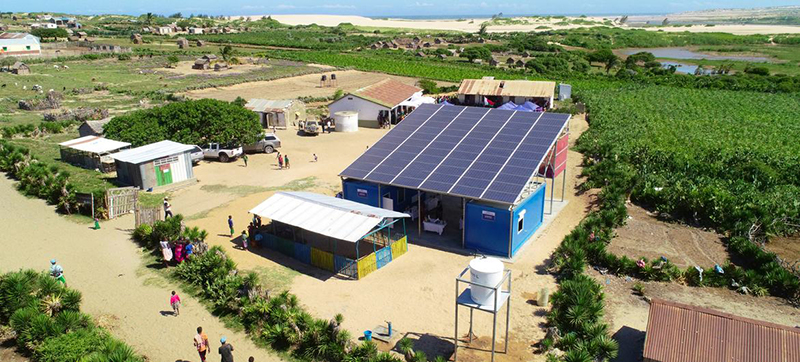 Madagascar
Madagascar New York: An innovative project seeking to develop climate resilience, self-sufficiency and the empowerment of vulnerable rural communities in southern Madagascar, could offer a game-changing template for future humanitarian work, the UN World Food Programme (WFP) said on Friday.
Focusing on remote Androy and Anosy regions – some four hours’ drive from the capital, Antananarivo - WFP’s Rapid Rural Transformation initiative delivers solar-powered hubs, a sustainable water source and digital health check-ups, in partnership with the Government.
The benefits for communities are multiple and welcome: energy, water and digital platforms, all provided in an environmentally responsible and sustainable manner, the UN agency said.
Boosting empowerment
Equally important, the project seeks to stimulate grassroots development, while addressing rural communities’ most pressing needs. If successful, WFP plans to take the idea to other villages and regions.
“With this pilot project, we will facilitate rural transformation even in geographically isolated areas, through the provision of clean water for irrigation, the operation of healthcare facilities, the expansion of entrepreneurial opportunities, and the development of their agricultural value chains,” said Jocelyn Raharimbola, Governor of Anosy region.
“Following years of food insecurity, data on the ground shows an improvement in the nutritional situation thanks to emergency interventions and collaboration with agencies such as WFP.”
The initiative is managed by regional authorities and allows partners to offer additional services including entrepreneurial training for women and younger members of the community.
Classes are available online on sustainability, business skills and farming, which is enhanced by easily installed solar-powered drip irrigation and hydroponics systems. The programme’s environmentally responsible and sustainable approach is a “game-changer”, maintained Tomson Phiri, WFP Regional Communications Lead and Spokesperson for Southern Africa.
Abundant sun
“If there is anything that the people in the south have, it is the abundance sunlight; it is hot, it is dry…we are establishing solar powered hubs that will provide a sustainable water source to the sites that I visited, we’ve introduced ICT (Information Communications Technology) in these remote areas, allowing for the provision of essential services be it energy, green energy, be it water, and digital platforms to members of the community.”
Mr. Phiri, speaking via Zoom from the capital, Antananarivo, told journalists in Geneva that while it was cyclone season in the north, the south was experiencing near-drought conditions.
Food insecurity remains an ever-present threat, the WFP spokesperson continued, with 2.2 million people in the southern and southeastern regions of Madagascar facing high levels of food insecurity during the pre-harvest period between now and April 2023.
Phiri said that the hubs were providing digital classrooms for learners: "I saw young people, we are nurturing dreams there, I met people, we are even sparking artisanal enterprises. I saw a welder just starting to use solar energy for his own enterprise, saw a barbershop, I saw a community that is being brought together by technology.”
Unenviable record
Madagascar is among the 10 countries most vulnerable to disasters in the world and is considered the most cyclone-exposed country in Africa, according to WFP.
The UN agency added that Androy and Anosy regions are at the sharp end of the climate crisis and have high rates of chronic malnutrition among children under five.
The Rapid Rural Transformation (RRT) initiative combines two climate risk mitigation strategies to assist people: better natural resource management through enhanced agricultural techniques to protect food production and diversifying their livelihoods to withstand climate shocks.
The UN WFP is the world’s largest humanitarian organization saving lives in emergencies and using food assistance to build a pathway to peace, stability and prosperity for people recovering from conflict, disasters, and the impact of climate change.
Support Our Journalism
We cannot do without you.. your contribution supports unbiased journalism
IBNS is not driven by any ism- not wokeism, not racism, not skewed secularism, not hyper right-wing or left liberal ideals, nor by any hardline religious beliefs or hyper nationalism. We want to serve you good old objective news, as they are. We do not judge or preach. We let people decide for themselves. We only try to present factual and well-sourced news.







